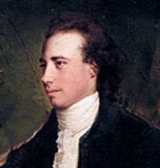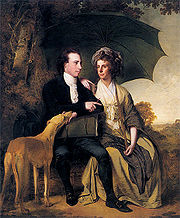
Thomas Gisbourne
Encyclopedia
Thomas Gisborne was an Anglican divine, priest and poet. He was a member of the Clapham Sect
, who fought for the abolition
of the slave trade in England.
, Staffordshire
and his wife Anne Bateman. He was educated at Harrow
and entered St John's College
, Cambridge
in 1776, where he established life-long friendships with William Wilberforce
and Thomas Babington
. At Cambridge, he became the first Chancellor's medallist in 1780.
In 1783 he became curate of Barton-under-Needwood
, and later that year inherited Yoxall
Lodge, Staffordshire
, which was 3 miles from the church. The next year he married Mary Babington (b. 1760). They had six sons and two daughters. The eldest son, Thomas Gisborne (1794–1852), became a member of parliament, and the fourth son, James, a clergyman, succeeded his father as perpetual curate of Barton in 1820.
Gisbourne was a central figure in the Clapham Sect
, an abolitionist group which included William Wilberforce and Gisbourne's brother-in-law Thomas Babington. Yoxall Lodge acted as a major focus of the group, and Wilberforce was a frequent visitor there.
Gisborne was appointed prebendary
of Durham Cathedral
in 1823. He died at Yoxall Lodge on 24 March 1846 at the age of eighty-seven. Gisborne left money for an annual scholarship at the University of Durham, which is referred to as the Gisborne Scholarship.
 Gisbourne's Principles of Moral Philosophy (1789) was a forceful evangelical attack on William Paley
Gisbourne's Principles of Moral Philosophy (1789) was a forceful evangelical attack on William Paley
's Principles of Moral and Political Philosophy (1785), an influential work studied at both Cambridge and Oxford Universities, arguing morality
as a categorical imperative
against Paley's utilitarian
standpoint. Gisborne also wrote Enquiry into the Duties of Men (1795) and Enquiry into the Duties of the Female Sex (1797) stressing subordination to the divinely imposed social hierarchy. His Walks in a Forest (1794) was a book of poems describing the scenery of Needwood Forest
, which bordered his estate at Yoxall
.
Clapham Sect
The Clapham Sect or Clapham Saints were a group of influential like-minded Church of England social reformers based in Clapham, London at the beginning of the 19th century...
, who fought for the abolition
Abolitionism
Abolitionism is a movement to end slavery.In western Europe and the Americas abolitionism was a movement to end the slave trade and set slaves free. At the behest of Dominican priest Bartolomé de las Casas who was shocked at the treatment of natives in the New World, Spain enacted the first...
of the slave trade in England.
Life
Gisborne was born at Bridge Gate, Derbyshire, the son of John Gisborne of Yoxhall Lodge in Needwood ForestNeedwood Forest
Needwood Forest was a large area of ancient woodland in Staffordshire which was largely lost at the end of the 18th century.-History:Needwood Forest was a chase or royal forest given to Henry III's son Edmund Crouchback, 1st Earl of Lancaster, in 1266...
, Staffordshire
Staffordshire
Staffordshire is a landlocked county in the West Midlands region of England. For Eurostat purposes, the county is a NUTS 3 region and is one of four counties or unitary districts that comprise the "Shropshire and Staffordshire" NUTS 2 region. Part of the National Forest lies within its borders...
and his wife Anne Bateman. He was educated at Harrow
Harrow School
Harrow School, commonly known simply as "Harrow", is an English independent school for boys situated in the town of Harrow, in north-west London.. The school is of worldwide renown. There is some evidence that there has been a school on the site since 1243 but the Harrow School we know today was...
and entered St John's College
St John's College, Cambridge
St John's College is a constituent college of the University of Cambridge. The college's alumni include nine Nobel Prize winners, six Prime Ministers, three archbishops, at least two princes, and three Saints....
, Cambridge
University of Cambridge
The University of Cambridge is a public research university located in Cambridge, United Kingdom. It is the second-oldest university in both the United Kingdom and the English-speaking world , and the seventh-oldest globally...
in 1776, where he established life-long friendships with William Wilberforce
William Wilberforce
William Wilberforce was a British politician, a philanthropist and a leader of the movement to abolish the slave trade. A native of Kingston upon Hull, Yorkshire, he began his political career in 1780, eventually becoming the independent Member of Parliament for Yorkshire...
and Thomas Babington
Thomas Babington
Thomas Babington was an English philanthropist and politician. He was a member of the Clapham Sect, alongside more famous abolitionists such as William Wilberforce and Hannah More...
. At Cambridge, he became the first Chancellor's medallist in 1780.
In 1783 he became curate of Barton-under-Needwood
Barton-under-Needwood
Barton-under-Needwood is a large village in Staffordshire, England, a mile from the A38 between Burton upon Trent and Lichfield. It has a population of about 5000, many of whom commute to Burton or Lichfield or further afield to places such as Derby or Birmingham- Overview :The village has a...
, and later that year inherited Yoxall
Yoxall
Yoxall is a large village in Staffordshire, England. It is on the banks of the River Swarbourn on the A515 road north of Lichfield and south west of Burton upon Trent...
Lodge, Staffordshire
Staffordshire
Staffordshire is a landlocked county in the West Midlands region of England. For Eurostat purposes, the county is a NUTS 3 region and is one of four counties or unitary districts that comprise the "Shropshire and Staffordshire" NUTS 2 region. Part of the National Forest lies within its borders...
, which was 3 miles from the church. The next year he married Mary Babington (b. 1760). They had six sons and two daughters. The eldest son, Thomas Gisborne (1794–1852), became a member of parliament, and the fourth son, James, a clergyman, succeeded his father as perpetual curate of Barton in 1820.
Gisbourne was a central figure in the Clapham Sect
Clapham Sect
The Clapham Sect or Clapham Saints were a group of influential like-minded Church of England social reformers based in Clapham, London at the beginning of the 19th century...
, an abolitionist group which included William Wilberforce and Gisbourne's brother-in-law Thomas Babington. Yoxall Lodge acted as a major focus of the group, and Wilberforce was a frequent visitor there.
Gisborne was appointed prebendary
Prebendary
A prebendary is a post connected to an Anglican or Catholic cathedral or collegiate church and is a type of canon. Prebendaries have a role in the administration of the cathedral...
of Durham Cathedral
Durham Cathedral
The Cathedral Church of Christ, Blessed Mary the Virgin and St Cuthbert of Durham is a cathedral in the city of Durham, England, the seat of the Anglican Bishop of Durham. The Bishopric dates from 995, with the present cathedral being founded in AD 1093...
in 1823. He died at Yoxall Lodge on 24 March 1846 at the age of eighty-seven. Gisborne left money for an annual scholarship at the University of Durham, which is referred to as the Gisborne Scholarship.
Writing

William Paley
William Paley was a British Christian apologist, philosopher, and utilitarian. He is best known for his exposition of the teleological argument for the existence of God in his work Natural Theology, which made use of the watchmaker analogy .-Life:Paley was Born in Peterborough, England, and was...
's Principles of Moral and Political Philosophy (1785), an influential work studied at both Cambridge and Oxford Universities, arguing morality
Morality
Morality is the differentiation among intentions, decisions, and actions between those that are good and bad . A moral code is a system of morality and a moral is any one practice or teaching within a moral code...
as a categorical imperative
Categorical imperative
The Categorical Imperative is the central philosophical concept in the moral philosophy of Immanuel Kant, as well as modern deontological ethics...
against Paley's utilitarian
Utilitarianism
Utilitarianism is an ethical theory holding that the proper course of action is the one that maximizes the overall "happiness", by whatever means necessary. It is thus a form of consequentialism, meaning that the moral worth of an action is determined only by its resulting outcome, and that one can...
standpoint. Gisborne also wrote Enquiry into the Duties of Men (1795) and Enquiry into the Duties of the Female Sex (1797) stressing subordination to the divinely imposed social hierarchy. His Walks in a Forest (1794) was a book of poems describing the scenery of Needwood Forest
Needwood Forest
Needwood Forest was a large area of ancient woodland in Staffordshire which was largely lost at the end of the 18th century.-History:Needwood Forest was a chase or royal forest given to Henry III's son Edmund Crouchback, 1st Earl of Lancaster, in 1266...
, which bordered his estate at Yoxall
Yoxall
Yoxall is a large village in Staffordshire, England. It is on the banks of the River Swarbourn on the A515 road north of Lichfield and south west of Burton upon Trent...
.
Scriptural geologist
A scriptural geologist, Gisborne wrote two books which criticized the trend of geology away from a basis in the Bible: Testimony of Natural Theology to Christianity (1818) and Considerations on Modern Theories of Geology (1837). Though a clergyman and not a geologist, Gisborne was not totally ignorant in natural history and geology due to his extensive reading and his own observations in his rural parish.Published works
- Principles of Moral Philosophy, (1789)
- Remarks Respecting the Abolition of the Slave Trade, (1792)
- Walks in a Forest, (1794)
- An Enquiry Into the Duties of Men in the Higher and Middle Classes of Society" in Great Britain (1794)
- An Enquiry into the Duties of the Female Sex, (1797)
- Poems Sacred and Moral, (1798)
- A Selection of Psalms and Hymns for Public and Private Use, with Jonathan Stubbs (1805).
- Sermons Volume 1 http://books.google.co.uk/books?id=2WIAAAAAMAAJ&dq=%22Thomas+Gisborne%22+Yoxall&source=gbs_summary_s&cad=0
- A Familiar Survey of the Christian Religion and of History, (1810)
- Testimony of Natural Theology to Christianity (1818)
- Essays on Recollection of Friends in a Future State (1822)
- Considerations on Modern Theories of Geology (1837)
Hymns
- A Soldier’s Course from Battles Won
- Hark! ’Tis the Bell with Solemn Toll
- O Father, Glorify Thy Name
- Saviour, When Night Involves the Skies
- Thy Humblest Works with Full Accord
- When Groves by Moonlight Silence Keep

